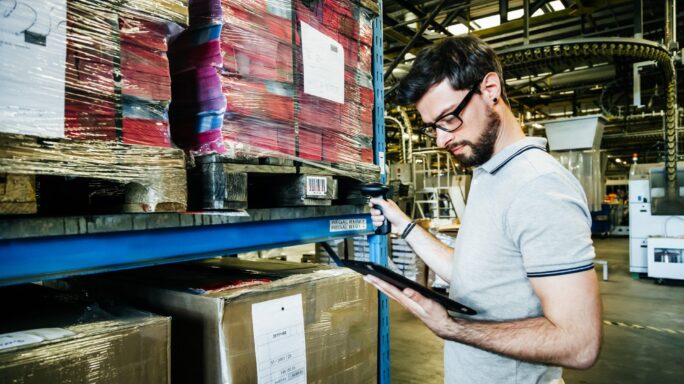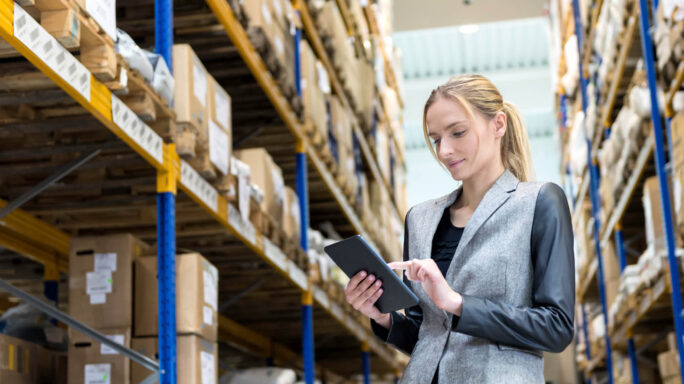What do the Brexit technical notices mean for small businesses?
The British government has published 25 out of a planned 84 Brexit technical notices. Here's the answers to questions asked by small businesses.

The British government has published 25 out of a planned 84 Brexit technical notices looking at how UK businesses and citizens can prepare for a no-deal Brexit outcome.
The collection of technical notices is entitled “How to prepare if the UK leaves the EU with no deal“, although the government repeats throughout that a no-deal Brexit is “unlikely given the mutual interests of the UK and the European Union in securing a negotiated outcome”.
Small businesses are affected by the notices and in particular those covering:
- Importing and exporting
- Money and tax
- Farming
- Workplace rights
Here, we take a look at some of the key points raised in the documents from a small business perspective. Remember throughout that we’re basing this advice on the government guidance that assumes a no-deal Brexit, even though all parties involved believe a no-deal Brexit to be both undesirable and unlikely.
The government says further technical notices will be published later in September 2018. In the fast-moving world of Brexit negotiations it’s not clear if these will also assume a no-deal scenario. This blog post will be updated periodically when further technical notices becomes available from the government.
What’s behind the Brexit technical notices?
The EU and UK have both stated they remain confident that a withdrawal agreement will be negotiated before the Brexit date of 29 March 2019.
However, there is a risk that the agreement may not be ratified by the deadline. In that event, the UK would revert to “third country” status, which means it would be treated the same as countries that lack any free trade agreements for tax, customs, and the movement of goods and people within the EU.
Additionally, in a no-deal scenario the UK will not immediately switch to being part of the European Free Trade Association (EFTA) or the European Economic Area (EEA), like Norway and Lichtenstein. Even outside of a no-deal outcome, the government has made it clear the UK will be leaving the EU single market and Customs Union, although it hopes to create a partnership with similar benefits.
The technical notices from the UK government include unilateral commitments intended to simplify trade and day-to-day activities in a no-deal scenario.
This includes deferred VAT accounting to partially offset the cash flow impact of no longer being part of the EU VAT regime, and the temporary permissions regime to give financial service organisations up to three years to re-register with a UK authority, reducing any disruption on small business that may use European financial service providers (such as banks and credit card companies).
The notices are the only guidance provided thus far by the Department for Exiting the European Union outside of specialist documents. Therefore, businesses should take the opportunity to at least review what is said, even if – despite the impending Brexit deadline – implementing any of the guidance might be hasty at this stage.
Brexit: The UK transition
Need help making changes to your business processes now that a UK-EU trade deal is in place? We're here and ready to support you to make them.

How will my business import and export from the EU after Brexit?
Import and export costs for all businesses are likely to rise after Brexit, with a need to put new administrative measures in place, complete additional formalities and potentially redefine the nature of your business.
This will particularly impact smaller businesses that might feel the increased administrative costs more acutely, especially if these businesses have never traded outside the EU. Smaller businesses with fewer administrative resources might need to start their preparations earlier too.
With a no-deal Brexit, the UK will no longer have the same access to free trade with EU countries that it does now. As a result, questions of importing and exporting can be answered in a reasonably straightforward way because trading with countries inside the EU will become similar to trading with those outside the EU, such as the US:
- Importing and exporting goods from the UK to EU countries will require import or export declarations (and vice versa for any EU businesses that export to you).
- Some products will require separate safety and security declarations, such as proof products complying with EU safety legislation.
- Customs duties might need to be paid, although existing customs procedures that delay or relieve custom payments might also be utilised. World Trade Organisation (WTO) most-favoured-nation (MFN) rules will apply, meaning that unless a preferential agreement is in place, the duty for a particular item applied by the UK or EU must be identical to that applied to all other WTO countries.
In other words, those companies that already also import or export to non-EU countries will be able to largely transfer their existing processes to cover all countries outside the UK.
Does my business need to register for an EORI number?
Those businesses that have only ever imported and/or exported between EU countries and will face wholly new administration burdens that will require significant preparation before March 2019.
Specifically, businesses that have only imported or exported within the EU and want to import or export their own goods across the UK/EU border will need to register for an Economic Operator Registration and Identification (EORI) number.
However, the government says this need not be done right now and that more information will become available as we approach the Brexit date in March 2019.
But if it transpires an EORI number is required then businesses should apply as soon as possible bearing in mind a vast number of businesses will suddenly be applying simultaneously, and therefore the system for handling applications is sure to become congested.
Preparing for Brexit
Your business needs to put contingency plans in place in case of a no-deal Brexit. Read this white paper for advice to help you start your preparations.

From arrivals and dispatches to imports and exports
The movement of goods between countries within the EU is described as arrivals and dispatches. Moving goods across the EU border is described as imports and exports. After Brexit, moving goods between the EU and UK will switch from arrivals and dispatches to imports and exports.
Businesses will therefore need to change their contracts and international terms and conditions of service (INCOTERMS) to reflect their classification as an importer or exporter (if they haven’t already).
For business that want to continue to move goods across the UK/EU border and do not want to manage the increased administrative burden themselves, the UK government has suggested engaging an agent such as a customs broker, freight forwarder or logistics provider.
Alternatively, businesses might wish to use software to work with HMRC to automate some of the additional procedures. This can be of particular use when it comes to utilising customs procedures, as mentioned above.
Businesses will also need to know how to classify and value their goods correctly when completing import, export and customs documentation. Goods will need to correctly coded according to the World Customs Organisation’s harmonised codes, which again will add an administrative stage that might not have existed previously.
The Excise Movement and Control System (EMCS) will no longer control suspended movements between the EU and UK, although it will still be used for duty suspended excise goods in the UK.
Importing after Brexit
For individual imports, businesses will need to make sure their carrier has submitted an Entry Summary Declaration, and they or their agent has submitted an import declaration. Businesses will need to pay VAT and import duties, if required, at a rate set by the UK government. Duty suspension goods will need to be declared on EMCS for onward movement via a registered consignor.
Exporting after Brexit
Individual exports will need an export declaration lodged in advance in order to gain permissions for the goods to leave the UK. This also acts as an Exit Summary Declaration. Again, EMCS will need to record duty suspected movement of goods from a UK warehouse to the export port. Those in the EU receiving the goods will need to pay customs duty at the EU’s Common Customs Tariff (CCT).
Trading between Ireland and Northern Ireland after Brexit
Within the technical notices, the government has not provided any further explanations about this border arrangement, other than that it intends to “respect our unique relationship with Ireland” along with the Belfast Agreement.
Trade remedies after Brexit
Following Brexit, the UK will have a new non-departmental public body called the Trade Remedies Authority (TRA) that will investigate the likes of unfair trading and unforeseen surges in imports that are likely to damage UK industry. The UK will no longer be part of the European Commission (DG Trade) but will be “maintaining EU measures which matter to the UK”.
How will VAT change after Brexit?
VAT within the UK will not change following Brexit (that is, domestic VAT) but in a no-deal scenario, there will be VAT changes for business that import and export from the EU (including services). These will add new challenges for businesses and might require specialist knowledge of international VAT requirements.
Here are the salient points:
VAT: Importing into the UK
In the event of a no-deal, the UK government has said it will reintroduce postponed VAT accounting for import VAT. This will mean VAT-registered businesses will be able to account for import VAT in their VAT return, rather than paying it as the goods arrive at the UK border. This should ease some of the administrative burden although could require additional record-keeping.
HMRC will need to issue additional guidance on how to register for postponed VAT accounting and changes to the periodic VAT return (VAT 100) and, of course, VAT return requirements might change accordingly – something businesses should be prepared for.
VAT: Parcels arriving into the UK
Outside of items relieved from VAT under domestic rules, such as zero-rated children’s clothing, VAT will be payable on parcels coming into the UK. HMRC has said that in the event of a no-deal, the Low Value Consignment Relief (LVCR) will be withdrawn.
For parcels that are £135 and lower, the overseas business sending the parcel will be expected to charge VAT at the point of purchase. They will do this via a “technology-based solution” that will require them to register with HMRC, and that will open for registration in early 2019. For parcels valued over £135, VAT will be collected in line with existing procedures from non-EU countries (see HMRC VAT Notice 143).
VAT: Exporting goods from the UK
EU businesses receiving goods from the UK will apply VAT and customs duty, so UK businesses will need to be aware of each EU country’s regulations and paperwork requirements. Business in the UK that export goods to the EU will need to account for the sale at zero rate.
The customer in the EU will then account for the VAT as if the goods were locally purchased (i.e. using local VAT rates), using the same procedures as EU businesses currently operate for imports purchased outside the EU.
UK business will no longer need to complete EC sales lists. There will still need to be records of these sales, of course, and requirements will be similar to that currently required for non-EU countries, although the notice says any differences will be “communicated in due course”.
VAT: Supplying services
The “place of supply” rules will remain the same.
For those supplying digital services, the place of supply will continue to be where the customer resides. For insurance and financial services input VAT deduction rules might change, and the government promises more information on this in due course.
Those using the UK VAT Mini One Stop Shop (MOSS) will need to register for the VAT MOSS non-Union scheme in each EU member state, something that can only be done post-Brexit, or simply register for VAT in each EU member state where sales are made.
VAT: Refunds
UK businesses will lose access to the EU VAT refund system and will need to use existing processes that are currently applied to non-EU businesses. How to claim VAT refunds varies across the EU, so there will be varying administrative requirements.
How are business workplace regulations affected by Brexit?
Here at least we have a relatively straightforward answer from the perspective of small businesses. The government points out that although the UK’s workplace rights and protections come from EU law, existing UK laws exceed EU-required levels of employment protection. And in any event, the EU (Withdrawal) Act 2018 will bring across the powers from EU Directives upon Brexit.
Therefore, very little should change in terms of required knowledge or administrative burden.
If your business operates across two or more EU countries then you might have had to establish a European Works Council.
Following a no-deal scenario, the UK government will continue to ensure these work for employees but UK regulations will be amended so that no new requests to set up a European Works Council can be made.
Organisations that were mandated to set up work councils because UK employees counted towards the number of employee and number of country thresholds may find they are no longer mandated to retain work councils.
How will farming be affected by Brexit?
The government discusses only the Common Agricultural Policy (CAP), Rural Development Programmes and the Basic Payment Scheme (BPS) in the technical notices seen so far.
In summary, no matter what kind of Brexit deal is achieved the government has pledged to provide all funding for farm support under Pillar 1 and Pillar 2 of the CAP until the end of the parliament, expected in 2022. This will apply to all of the UK. The requirements the CAP places on farmers are likely to stay the same.
As for EU Rural Development Programmes specifically, the government has said in the event of no-deal that it will fund projects that have been agreed before the end of 2020 for their full lifetime. In other words, the government will pick up funding from the EU and new projects will continue to be signed up during 2019 and 2020 after the UK leaves the EU.
The Department for Environment, Food and Rural Affairs (Defra) and the devolved administrations are working together to create agricultural policies in consultation with each country in the UK.
How will state aid work after Brexit?
Presently the EU governs state aid, such as block exemptions like the Agricultural Block Exemption Regulation and the Fisheries Block Exemption Regulation. Following a no-deal Brexit, the UK will create a subsidy control framework that will be overseen by the Competition and Markets Authority.
EU state aid rules will be transposed into UK legislation under the European Union (Withdrawal) Act and this will apply to all businesses operating in the UK, whether they’re UK, EU or third-country based. UK legislation will mirror existing block exemptions.
Preparing a small business for Brexit
A successful Brexit process for any business will be one in which solid cash flow and productivity are as little impacted as possible. While it’s true that there is little, if any, practical preparation that can be undertaken immediately by businesses right now until negotiations are complete and the Withdrawal Agreement is published later in 2018, ensuring you always understand the basics of VAT and your import and export position is sound advice regardless of the situation.
You should read the full details of the existing technical notes, and perhaps even research how the EU currently conducts trade with third countries. The official website of the EU is Europa.eu, and its “Life and Business in the EU” pages contain a lot of information.
Similarly, if your business conducts trade with specific European countries then you might research how they handle customs declarations, duties and VAT payments for non-EU countries. Some countries have already started sharing information in preparation for Brexit, such as Ireland’s Department of Foreign Affairs and Trade.
If your business moves goods across the UK/EU border, you might consider making initial enquiries with a customs broker, freight forwarder or logistics provider.
If nothing else, those involved in the industry are sure to have a better understanding of any regulations within the eventual Withdrawal Agreement and their services are likely to be very heavily subscribed in the event of a no-deal Brexit scenario – so establishing contact sooner rather than later might pay benefits.
Preparing for Brexit
Your business needs to put contingency plans in place in case of a no-deal Brexit. Read this white paper for advice to help you start your preparations.






I have given feedback before – waste of time. I’ve been conned into upgrades, paying more for less, etc. That wasn’t my point. This was a Sage newsletter, and I expected Sage news – or at least advice regarding the software and how Brexit might affect it – or heaven-forbid Sage had made efforts to prepare the software for such outcomes – not a load more political scare-mongering.
You need to proof read this document your NI section does not make sense:
“Trading between Ireland and Northern Ireland after Brexit
Within the technical notices, the government has provided any further explanations about this border arrangement, other than that it intends to “respect our unique relationship with Ireland” along with the Belfast Agreement.”
Thanks Phil, this has been amended in the article.
Please just fix your software – or at least tell us how it will affect the use of your software – instead of spouting your unhelpful, negative, scare-mongering opinions regarding an already done – but difficult-deal. And take me off your newsletter if this is what I can typically expect. I never asked for it.